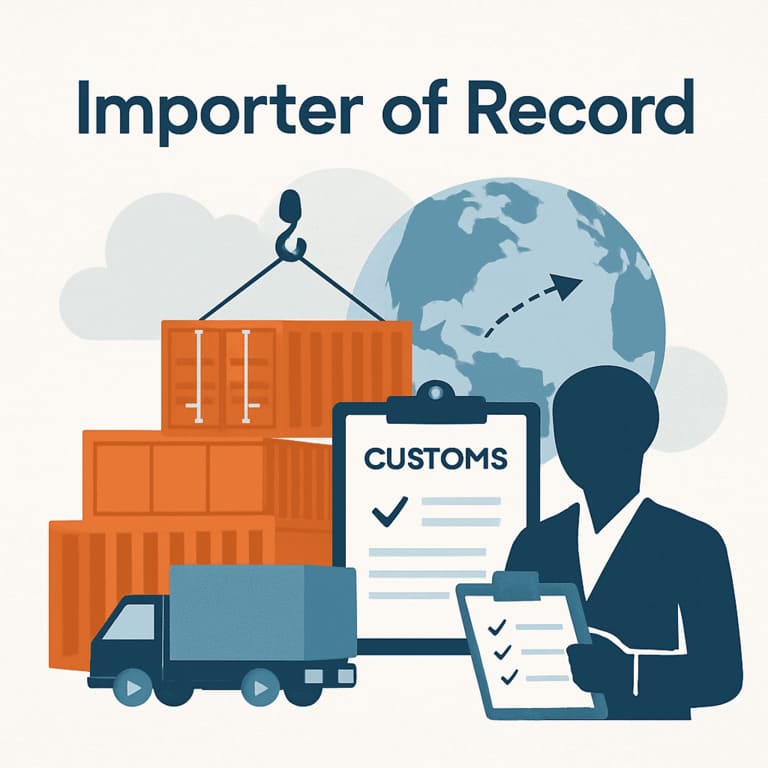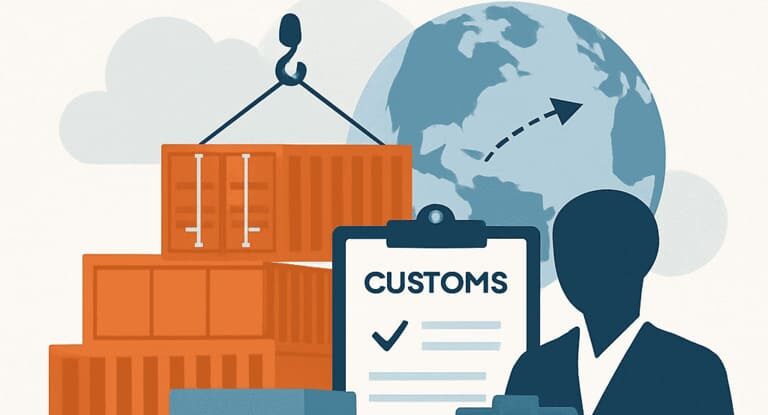Why Every Global Business Needs an Importer of Record: A Complete Guide to IOR Services
Understanding Importer of Record Services for Seamless International Trade
In today’s interconnected global marketplace, businesses of all sizes are expanding beyond borders. But with international expansion comes the complexity of cross-border trade regulations. One critical component often overlooked until it’s too late is the need for an Importer of Record. This comprehensive guide will walk you through everything you need to know about IOR services and why they’re essential for your global business strategy.
What Exactly Is an Importer of Record?

An Importer of Record (IOR) is the entity responsible for ensuring imported goods comply with local laws and regulations. They handle customs clearance, duty payments, and ensure all documentation is properly filed.
Think of an IOR as your business’s legal representative in a foreign country.
They take on significant responsibility. Without proper management, your valuable shipments could face delays, additional costs, or even rejection at customs.
The IOR appears on all official import documentation and bears legal responsibility for the accuracy of the information provided to customs authorities.
Why Your Business Might Need IOR Services
Moving products across international borders isn’t as simple as shipping a package domestically. Each country has unique import regulations, documentation requirements, and compliance standards.
Consider these scenarios where IOR services become critical:
– You’re expanding into new markets but lack a legal entity in those countries
– Your business needs to import technology equipment for temporary use
– You’re sending samples or demonstration products to international clients
– Your company is participating in trade shows abroad
In each case, someone must serve as the Importer of Record. Without a local business entity, you’ll need a third-party IOR service.
See More: ISF: Complete Guide to Importer Security Filing (10+2) Requirements
The Critical Benefits of Professional IOR Services
Regulatory Compliance Without the Headache
Navigating import regulations can be overwhelming. Professional IOR services maintain expertise in constantly changing customs requirements.
They ensure your imports comply with:
– Import licensing requirements
– Product certification standards
– Safety regulations
– Restricted or prohibited item lists
– Proper classification and valuation
This expertise prevents costly mistakes that could result in penalties, shipment delays, or merchandise seizures.
Risk Mitigation for Your Business
When importing goods, legal liability doesn’t end at customs clearance. An experienced IOR service absorbs significant legal risks associated with importing.
This includes:
– Ensuring accurate customs declarations
– Managing product compliance with local standards
– Handling proper tax calculations and payments
– Maintaining comprehensive documentation
Without proper management, these risks could expose your business to substantial penalties or legal complications.
Operational Efficiency and Cost Savings
Professional IOR services streamline the import process, reducing delays and unexpected costs.
Experienced providers:
– Pre-clear shipments when possible
– Manage documentation efficiently
– Optimize duty payments
– Prevent storage charges from customs delays
– Handle specialized imports like technology equipment
These efficiencies translate directly to your bottom line through faster market entry and reduced operational disruptions.
How to Choose the Right IOR Service Provider
Not all IOR service providers offer the same level of expertise or coverage. When evaluating potential partners, consider these essential factors:
Geographic Coverage
Assess whether the provider has established operations in your target markets. The best IOR partners offer:
– Presence in multiple countries
– Local expertise in each market
– Established relationships with customs authorities
– Understanding of regional trade agreements
Comprehensive geographic coverage ensures consistent service quality across all your import destinations.
Industry Expertise
Different product categories face varying import requirements. Technology imports, for example, often face stricter regulations than textile products.
Look for providers with specific experience in your industry who understand:
– Product-specific compliance requirements
– Appropriate HS code classifications for your goods
– Common challenges in your particular sector
– Special handling needs for your products
This specialized knowledge prevents costly mistakes and delays.
Technology and Reporting Capabilities
In today’s digital business environment, visibility into your supply chain is crucial. Superior IOR providers offer:
– Real-time tracking systems
– Digital documentation management
– Automated customs filing when available
– Comprehensive reporting on import activities
– Duty and tax payment tracking
These technological capabilities provide peace of mind and valuable data for business planning.
See More: AMS and US ACE: Complete Guide to Automated Manifest System and Customs Environment
Common Pitfalls When Managing Imports Without IOR Services

Many businesses attempt to navigate international imports without professional assistance, often with costly consequences.
Misclassification of Goods
Improper HS code classification can result in:
– Overpayment of duties
– Underpayment leading to penalties
– Delays during customs verification
– Application of incorrect restrictions
Professional IOR services ensure accurate classification, preventing these costly errors.
Incomplete Documentation
Missing or incorrect paperwork is the leading cause of customs delays. Common documentation issues include:
– Insufficient product descriptions
– Missing country of origin information
– Incomplete commercial invoices
– Inadequate packing lists
These seemingly minor oversights can result in significant delays and storage fees.
Failure to Comply with Local Requirements
Each country has unique import requirements beyond standard documentation. These might include:
– Product testing certifications
– Special labeling requirements
– Electronic filing mandates
– Pre-approval processes
Without local expertise, these requirements are easy to miss but difficult to resolve once your shipment is held at customs.
See More: The Complete Guide to ICS2 ENS Filing Requirements for Freight Forwarders
Conclusion: IOR Services as a Strategic Business Advantage
In today’s global marketplace, efficient cross-border trade is a competitive necessity. Professional Importer of Record services transform a potential operational challenge into a strategic advantage.
By partnering with an experienced IOR service provider, your business can focus on core operations while ensuring imports move smoothly across international borders. This expertise not only prevents costly delays and compliance issues but also provides valuable intelligence for future market expansion.
Whether you’re just beginning international operations or looking to optimize existing import processes, professional IOR services offer the expertise, risk management, and efficiency your business needs to thrive in global markets.
Remember that customs regulations and international trade requirements continuously evolve. Working with dedicated IOR professionals ensures your business remains compliant while maximizing operational efficiency in your global supply chain.
FAQ
1. What is an Importer of Record (IOR) and why is it important in international trade?
Answer:
An Importer of Record (IOR) is the legal entity responsible for ensuring that imported goods comply with the destination country’s laws, including customs clearance, duty and tax payment, and documentation. The IOR plays a vital role in international trade by assuming legal responsibility for the shipment, preventing delays, penalties, or confiscation at borders. For companies without a local entity, third-party IOR services are essential to enter foreign markets compliantly and efficiently.
2. When does a company need to use IOR services?
Answer:
Companies typically need IOR services when:
-
They do not have a registered legal entity in the destination country.
-
They are sending equipment for installation, maintenance, or demonstration abroad.
-
They are participating in international trade shows or sending product samples.
-
They want to avoid the administrative burden of import compliance.
IOR services enable businesses to expand globally without establishing subsidiaries, while remaining compliant with import regulations.
3. What risks can businesses face if they don’t use a qualified IOR?
Answer:
Without a qualified IOR, businesses risk:
-
Customs delays due to incorrect or incomplete documentation.
-
Legal penalties for non-compliance with import laws.
-
Product seizures or rejections at the border.
-
Higher costs due to misclassified duties or storage fees.
-
Damage to brand reputation in international markets.
A professional IOR minimizes these risks by managing compliance end-to-end, ensuring smooth customs clearance and reducing operational disruptions.
4. How does an IOR help ensure regulatory compliance during the import process?
Answer:
An IOR ensures compliance by:
-
Properly classifying goods under the Harmonized System (HS) codes.
-
Verifying that products meet destination country standards (e.g., CE, FCC, or local product certifications).
-
Ensuring correct documentation (commercial invoice, packing list, COO, etc.).
-
Handling restricted or controlled items appropriately.
-
Staying updated with changing trade laws and adjusting procedures accordingly.
This expertise protects the importer from financial and legal liabilities.
5. What documentation does an IOR typically manage during importation?
Answer:
An IOR handles all key import documents, such as:
-
Commercial invoice and packing list.
-
Bill of lading or air waybill.
-
Import permits or licenses (if required).
-
Product compliance certificates.
-
Customs declarations and electronic filings (e.g., ISF 10+2, ACE, ICS2 ENS).
-
Country of origin and valuation documentation.
The IOR ensures that every document is complete, accurate, and aligned with customs requirements to avoid shipment holds or fines.
6. How do IOR services contribute to cost savings for a business?
Answer:
IOR services save costs by:
-
Preventing penalties from incorrect filings or documentation errors.
-
Reducing warehousing or demurrage charges due to customs delays.
-
Optimizing duty and tax payments through proper classification.
-
Avoiding duplicate compliance infrastructure in multiple countries.
-
Enabling faster delivery times, which boosts customer satisfaction and cash flow.
Overall, IORs create both direct savings and indirect value through improved import reliability.
7. Can IOR services be used for temporary imports or demo equipment?
Answer:
Yes. IOR services are ideal for:
-
Temporary imports for trade shows or product demonstrations.
-
Loaned equipment for training or field testing.
-
Tools and parts used for short-term installation or service projects.
-
High-value electronics or telecom devices imported temporarily.
The IOR ensures temporary imports meet customs requirements (e.g., ATA Carnet alternatives or return procedures), helping businesses avoid permanent import taxes or penalties.
8. What qualities should you look for in a reliable IOR service provider?
Answer:
A trustworthy IOR provider should offer:
-
Broad geographic coverage and presence in your target markets.
-
Experience in your industry with knowledge of relevant product regulations.
-
Strong relationships with local customs and authorities.
-
Technological tools for tracking, documentation, and compliance reporting.
-
Transparent pricing and clearly defined service scope.
-
Proactive communication and regulatory updates.
Choosing the right provider ensures long-term success in your global logistics strategy.
9. How do IOR services integrate with customs platforms like ACE, ISF, and ICS2?
Answer:
Experienced IORs integrate directly with customs systems such as:
-
ACE (Automated Commercial Environment) in the U.S. for declarations and duty payments.
-
ISF (Importer Security Filing) for 10+2 data submission before ocean shipments.
-
ICS2 (Import Control System 2) in the EU for ENS (Entry Summary Declaration) filing.
Integration ensures real-time data transmission, regulatory compliance, and faster clearance, especially for time-sensitive or high-value shipments.
10. Is using an IOR a long-term or short-term solution?
Answer:
IOR services can be both:
-
Short-term: For one-time shipments, testing the market, or temporary imports.
-
Long-term: For companies without foreign subsidiaries that import regularly.
Many businesses start with IOR services to test new regions before deciding whether to invest in setting up a local entity. It’s a flexible solution that adapts to your growth stage.



